My first introduction to remote working in Munich was something very different. It was my first destination after choosing to leave Australia and move abroad entering a new country and language that I know nothing about. I didn’t have a clue what to expect apart from load of beer and festive activities, arriving in September. After 2 months of this I learned some valuable insight into German and Bavaria culture, navigating the beautiful city of Munich. I will share some of my experiences, the insights I gained, Accommodation, Transport, work-life balance and the many cultural activities Munich has to offer.
Note: many or all products featured here are from partnerships which do compensate me. However this does not influence my evaluations as my opinions are my own and brought upon from experience and using these products.
Table of Contents
First experience into working remotely in Munich:
Moving to Munich, Germany was always my plan after gradating from my degree of Industrial Design in Brisbane, Australia. I was hoping to go over initially for an internship but due to timing this was delayed, and I managed to pick up remote work as a Junior Industrial Designer. From this I made the decision to just go there as I had a stable income and wanted to test myself in a new place. Luckily, I had a friend living there already so I had a place to crash while staying and a local guide to Munich, helping me on my first remote work endeavour. I found it a slow adjustment at first coming into a new culture with a new language as I didn’t really know how to act or treat others at first. It was truly surreal, but I was loving being challenged by this and experiencing new things that where both exciting and confusing. I still remember my first shopping experiences trying to quickly back the bags with this not being common in Australia. I stayed 2 months in Munich before moving on, deciding to stay in Europe and travel. These 2 months gave me a valuable insight into German culture filled with food, beer and nature with so many highlights like Oktoberfest and Neuschwanstein Castle where amazing. I will explore some more of Munich and my time in detail below. If your looking for more information around what to pack or bring on your journey then feel free to check out my work-travel packing list post with more detail on this.
Housing and accommodation
When it comes to remote working in Munich, one of the first things you’ll need to consider is your housing and accommodation. For me I was extremely lucky to have a place to stay at my friends who lived in Pasing, Munich and this making it incredibly cheap as I only had to pay for the groceries. If this isn’t the case for you then it will be extremely difficult to find a place and one that is affordable. I initially tried to find a place in Munich to get my visa but couldn’t find one and is why I then moved to Berlin.
1. Housing Options
Munich does offer a wide range of housing options to suit various preferences and some budgets. You can choose from apartments, shared housing, single-family homes, and even serviced apartments. The city’s housing market is known for being of high quality, however I found it extremely difficult to find good options and within the city.
2. Neighbourhoods to Explore
Munich is divided into several neighbourhoods, each with its own unique charm. Some popular areas for remote workers include Schwabing, Glockenbachviertel, and Maxvorstadt, known for their vibrant cultural scenes and accessibility to co-working spaces. The choice of neighbourhood depends on your priorities, whether it’s proximity to workspaces, affordability, or a tranquil environment. Again I was lucky to have a place in Pasing, a very quiet and still very well connected area to Munich. It was very peaceful and opted to working from home during my stay.
3. Short-Term and Temporary Housing
If you’re unsure about committing to a long-term lease, Munich also offers short-term and temporary housing solutions. Serviced apartments, extended-stay hotels, and Airbnb rentals can provide flexibility and convenience for remote workers who prefer not to commit to a permanent residence. I was looking for a short-term monthly contract but I think due to being new and not knowing the language as well made it a lot more difficult for myself. This is why I ended up looking elsewhere in Germany finding the platform Housing Anywhere which has short term accommodation in many cities around Europe and I still heavily rely on this platform today.
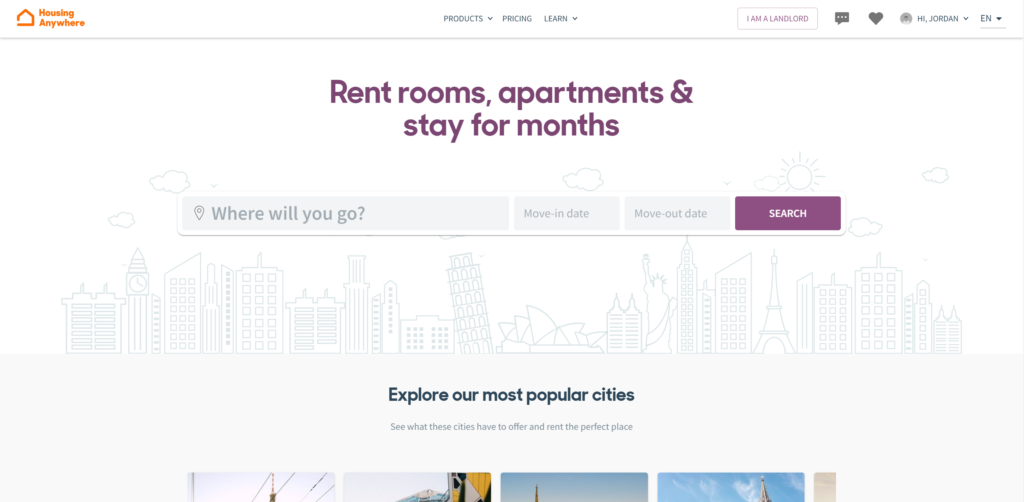
4. Cost of Housing
Munich is known for its high cost of living, including housing. While the prices may be on the higher side, it’s essential to weigh the cost against the quality of life and job opportunities in the city. Remote work often allows for more flexibility in location, so you can explore areas that offer a better balance between affordability and convenience. So, I would highly recommend the Pasing area as it was very peaceful and you still got a great community vibe.
5. Scams
Be very careful of scams as they are very common especially in Germany and almost got me. On Facebook these are very common and as I became more desperate to find a place I was little more accepting of deals and opportunity that seem too good. Its common for you to be offered a place but the landlord will say you can’t move in till the day and that they are currently “out of town” for the moment ect. This is why you defiantly should do some research and why I recommend Housing Anywhere. They do take a service fee but they keep your money until you actually move into the property and confirm its ok. Trust me this service is defiantly worth it.
Remote Working in Munich – Work-Life Balance
While being In a new city and country you find that there is a lot of new experiences to have, this only helps a work-life balance I feel, and for me offered a range of activities. I always like to get out of the house at least once a day even if it is just for a run which was perfect in my area with loads of green and nature surroundings for perfect running conditions. Having great public transport access is also very important and helps you get to new areas of Munich without having to fork out a lot of money. All these factors helped fuel my time in Munich while also very much grinding with my work. I was lucky enough to experience some awesome events, like Oktoberfest full of beers and laughs and even though more of an international event these days it was great to get some insight into the Bavaria culture.
Transportation and Mobility
Bringing us onto transportation. Navigating Munich as a remote worker requires a reliable and efficient transportation system. Understanding the city’s mobility options is crucial for a seamless remote work experience.
1. Public Transportation
Munich boasts an extensive and reliable public transportation network, making it easy to get around the city. The backbone of Munich’s transit system is the U-Bahn (subway), S-Bahn (commuter trains), trams, and buses. These options cover virtually every corner of the city, including suburban areas.
2. MVG Tickets and Fares
To use public transportation, you’ll need tickets or passes issued by the Munich Transport and Tariff Association (MVG). MVV tickets are available for single rides, day passes, weekly or monthly passes, and more. I would consider purchasing a monthly pass if you plan to use public transport regularly, as it can be cost-effective. I got the monthly ticket and the process of this is very similar with other countries.
3. S-Bahn and U-Bahn
The S-Bahn and U-Bahn are the mainstays of Munich’s transportation system. The S-Bahn connects the city center to the suburbs and neighboring regions, making it ideal for longer commutes. The U-Bahn is efficient for traveling within the city limits, reaching key destinations quickly.
4. Trams and Buses
Trams and buses complement the rail networks, providing additional coverage and flexibility. They are especially useful for accessing areas not directly served by the U-Bahn and S-Bahn lines. Timetables are generally reliable, and frequency is high during peak hours.
5. Bike-Friendly City
Munich is also very popular for biking with many people option for this option with great bike access across the city. E-scooters have increasing made there way to Munich with this being an extremely popular option and I tended to use this quite frequently.
6. Car Sharing and Taxis
While public transportation is excellent, there are times when you may need a car. Munich has car-sharing services like DriveNow and Flinkster, as well as traditional taxi services and of course Uber. Keep in mind that parking can be challenging and costly in the city centre. I was luckily that my friend had a car so this wasn’t to necessary for me.
7. Mobility Apps
To make navigating Munich’s transportation system even more convenient, consider downloading transportation apps like MVG Fahrinfo, which provide real-time information on routes, schedules, and ticket purchases. I found that Google and Apple maps where very efficient and probably the easiest option to navigate transport.
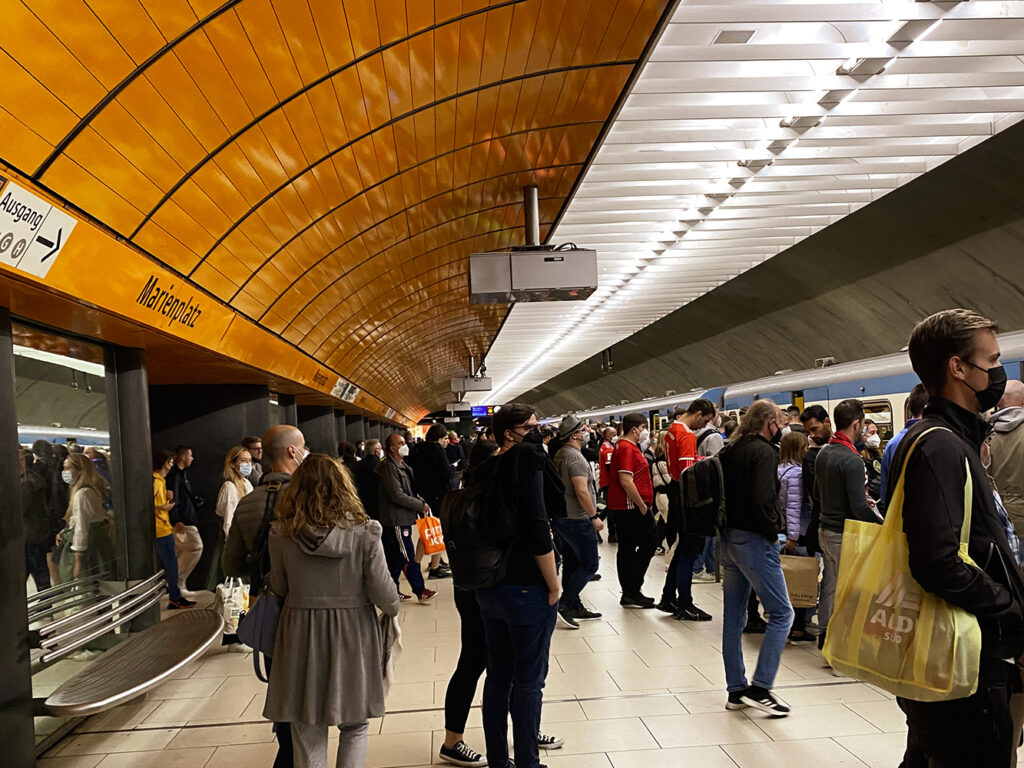
Cultural and Recreational Activities
While remote working in Munich, it’s not all about work. The city offers a vibrant cultural scene and a plethora of recreational activities to ensure a well-rounded experience. I found that there’s a lot to do depending on when your in the city.
1. Museums and Galleries
When first travelling overseas I wasn’t much of a museum person, so I didn’t really get to any museums in my time in Munich. This is really on your preference, and It wasn’t of great interest for me at the time. However, if this is what your looking for then The Alte Pinakothek, Neue Pinakothek, and Pinakothek der Moderne are great art institutions which you can check out. If your looking for a budget option then Germany has free entry to museums on the first Sunday of each month, but this does make it a very popular day.
2. Historical Sites
Munich is steeped in history, and you can explore it by visiting iconic sites such as Nymphenburg Palace, Munich Residenz, and the historic Marienplatz. These locations offer a glimpse into Bavaria’s rich heritage.
3. Day/Short Trips:
There are a lot of towns/cities close by Munich as it is very well connected and offers the luxury of visiting these places. I would like to mention Füssen where I stayed for a weekend that is located towards the Alps and you can find Neuschwanstein Castle there which was the inspiration for the Disney castle design. This place is defiantly a must visit with absolutely breath-taking views to see. Nuremberg is another popular town nearby that is also a fantastic place to visit.
4. Parks and Green Spaces
For relaxation and outdoor activities, Munich has an abundance of parks. The English Garden (Englischer Garten) is one of the largest urban parks globally, featuring serene lakes, meadows, and even a surfable river wave (must see). I didn’t get to experience this is summer but is a fantastic space for some German culture and amazing vibes.
5. Beer Gardens
Munich is notorious with beer gardens. These open-air establishments are perfect for socializing and trying traditional Bavarian dishes like pretzels and sausages. I became in love with the German beer and how much it is loved by the city.
6. Festivals and Events
Munich hosts numerous festivals and events throughout the year. As said earlier I was luckily enough to visit Oktoberfest which is a must-see festival especially for beer lovers around the world. The culture, people and mood were always high and everyone had an absolute blast at this festival. I am also a big fan of Music and constantly looking for live shows and attended a Lime Cordial concert which was fantastic. To find this I used the live music section on Spotify.
7. Food and Dining
You’ll probably here it a lot in my blog but I’m not the biggest foody currently and usually cook food with my current budget. However, Munich’s culinary scene is a delightful blend of traditional Bavarian cuisine and international flavours. Don’t miss the chance to try there local schnitzel, weißwurst (white sausage), and hearty sauerkraut.

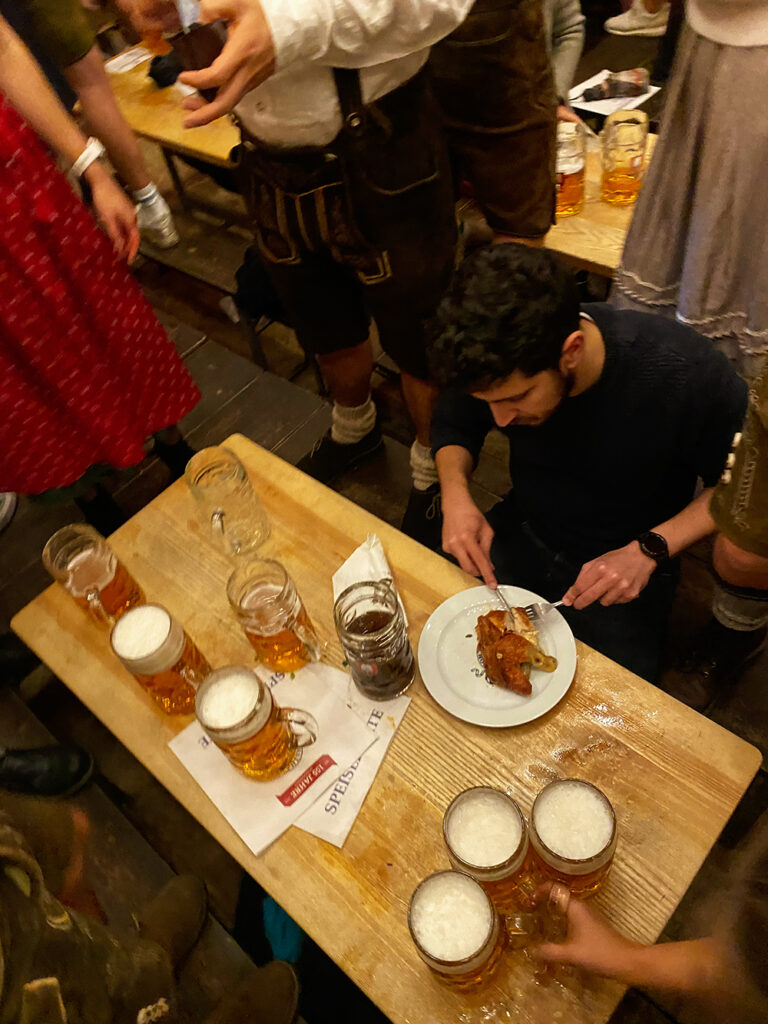
Remote working in Munich – Conclusion:
Overall, it was my first introduction to living abroad in a new country and new language, so it took me time to adjust and learn how to best adapt to my preferences while remote working in Munich. While Munich’s cost of living is relatively high, it’s essential to consider the quality of life, job opportunities, and cultural experiences the city provides. Many remote workers find the balance between cost and quality of life in Munich to be well worth it. Looking back now I feel I could have done a lot more, but I can’t deny that I had a fantastic time filled with experiences that I will hold for a lifetime. This not only helped me feel confident to travel and work but to take new risks, put myself out there and see what I can accomplish. So after 2 great months in Munich it was time to move on and continue my travels through Germany…
If you would like more information or want help about remote working and travel, please feel free to contact me for more.
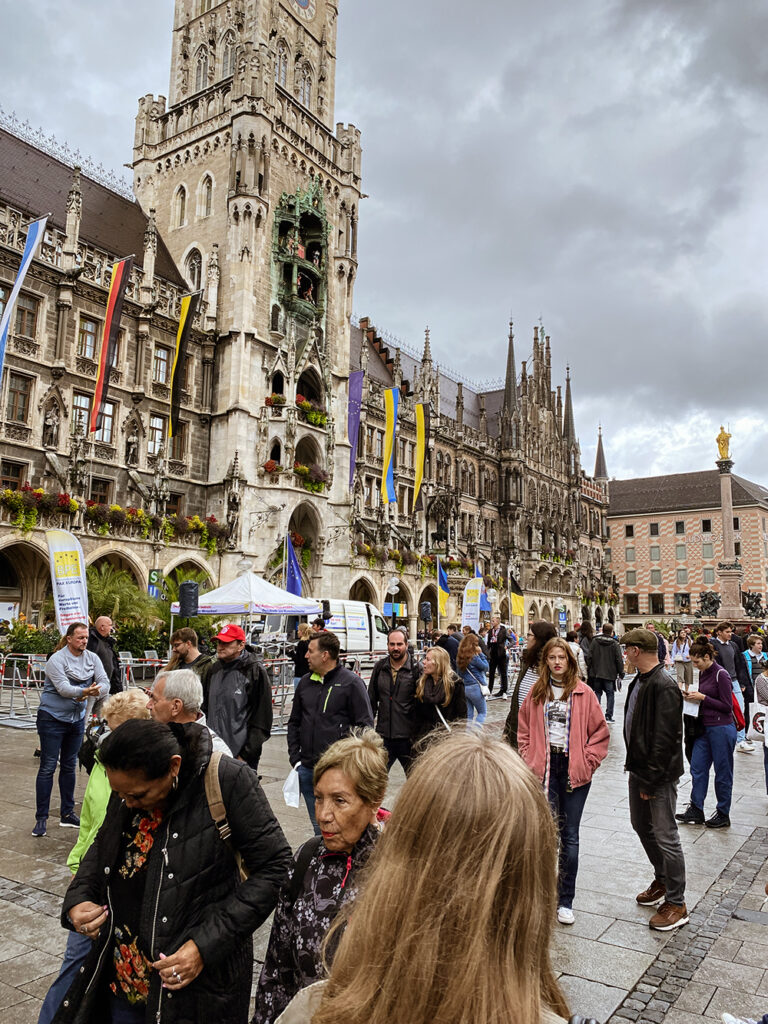
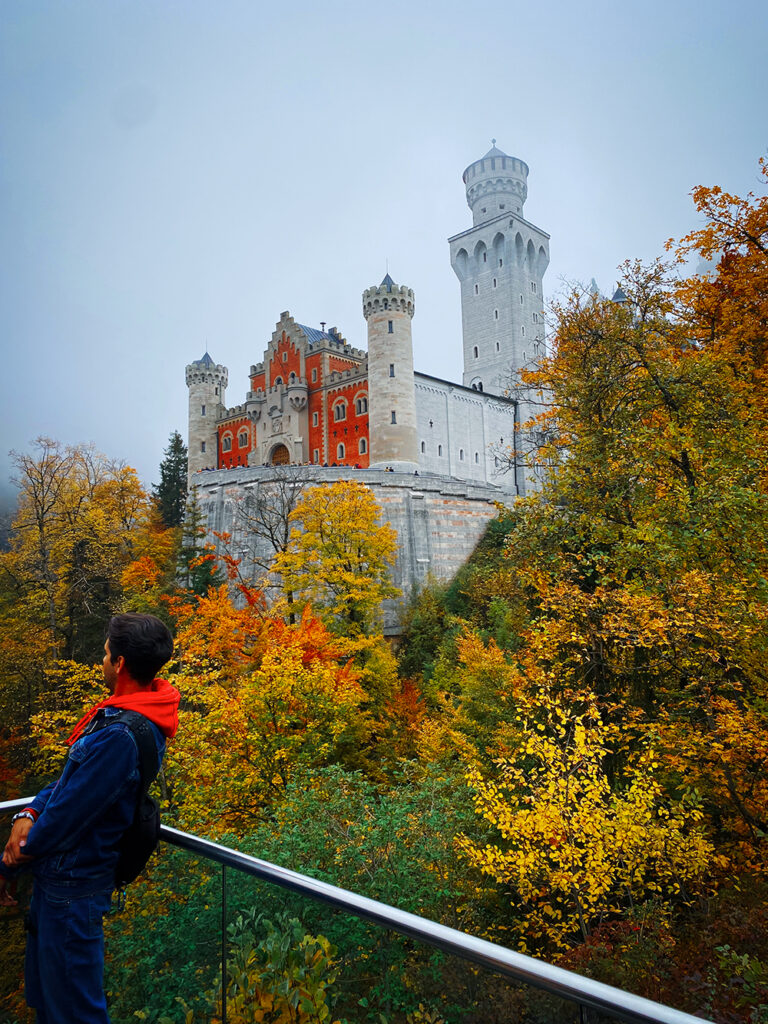
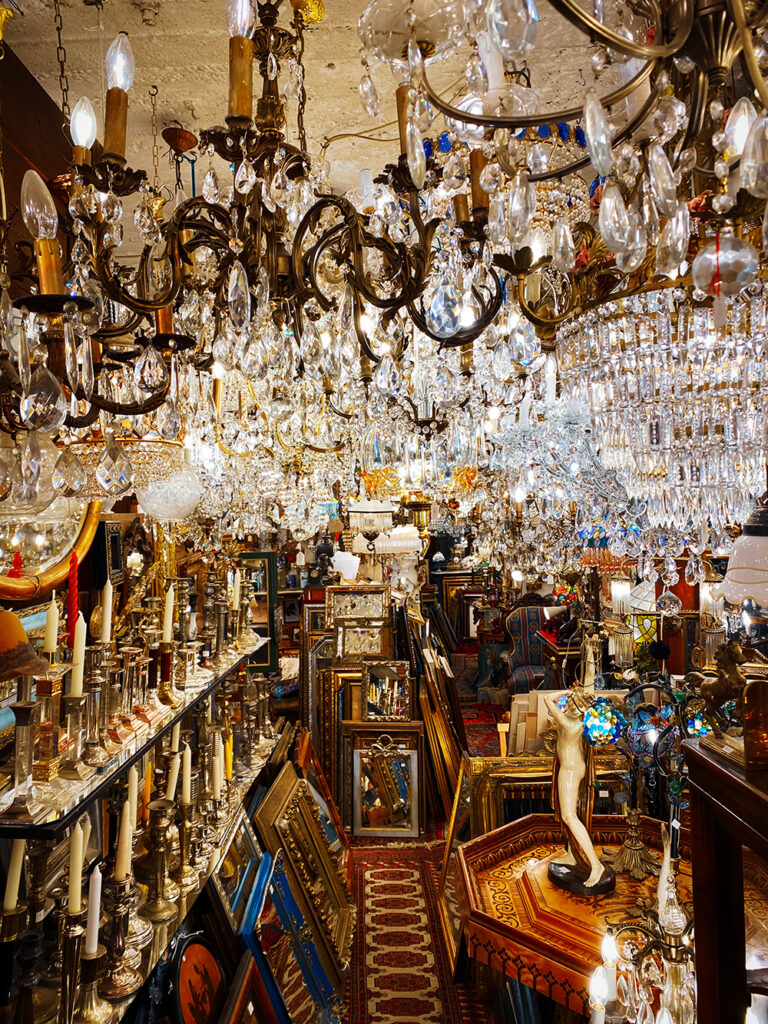

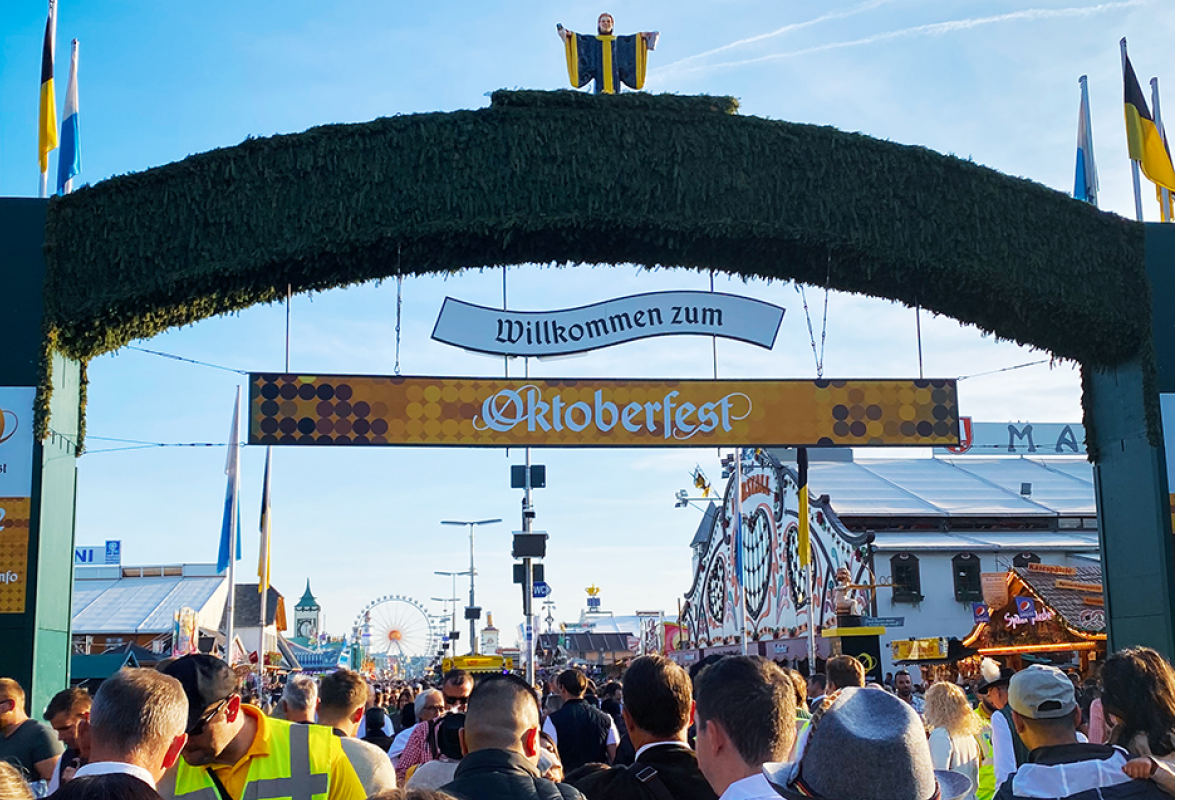
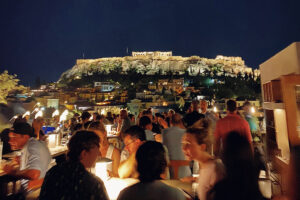
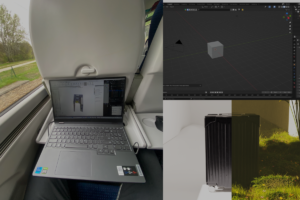
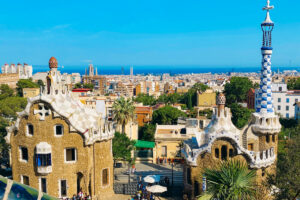
Pingback: My Story: Choosing To Travel and Work Full Time - The Travelling Designer